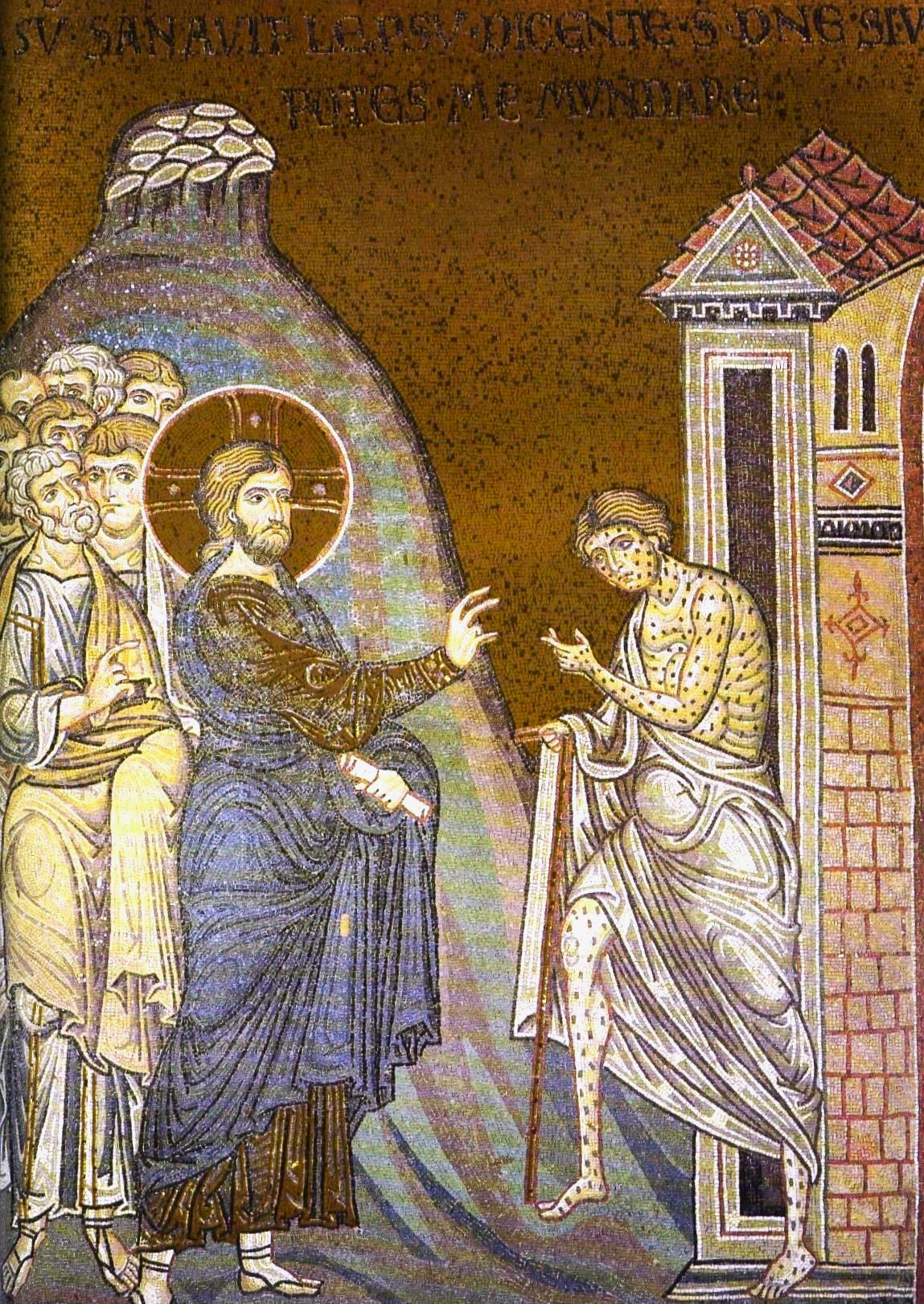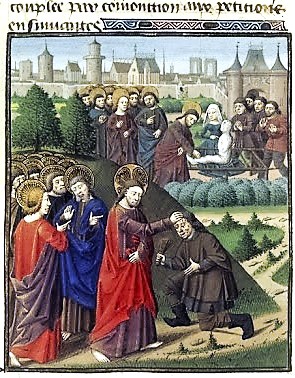Translation of the Holy Gospel According to Matthew
At that time, when Jesus was come down from the mountain, great multitudes followed Him: and behold a leper came and adored Him saying: Lord, if Thou wilt, Thou canst make me clean. And Jesus, stretching forth His hand touched him, saying: I will. Be thou made clean. And forthwith his leprosy was cleansed. And Jesus saith to him: See, thou tell no man: but go, show thyself to the priest, and offer the gift which Moses commanded, for a testimony unto them. And when He had entered into Capharnaum, there came to Him a centurion, beseeching Him, and saying: Lord, my servant lieth at home sick of the palsy, and is grievously tormented. And Jesus saith to him: I will come and heal him. And the centurion making answer said: Lord, I am not worthy that Thou should enter under my roof: but only say the word and my servant shall be healed. For I also am a man subject to authority, having under me soldiers; and I say to this: Go, and he goes; and to another: Come, and he comes; and to my servant: Do this, and he does it. And Jesus hearing this marveled, and said to them that followed Him: Amen I say to you, I have not found so great faith in Israël. And I say to you, that many shall come from the east and the west, and shall sit down with Abraham and Isaac and Jacob in the kingdom of heaven: but the children of the kingdom shall be cast out into the exterior darkness: there shall be weeping and gnashing of teeth. And Jesus said to the centurion: Go, and as thou hast believed, so be it done to thee. And the servant was healed at the same hour.
From St. John Chrysostom’s Homiles on Matthew, XXV
For when He was come down from the mountain, there came a leper, saying, Lord, if Thou wilt, Thou canst make me clean.” Great was the understanding and the faith of the leper who so drew near. For he did not interrupt the teaching, nor break through the auditory, but awaited the proper time, and approaches Him when He is come down. And not at random, but with much earnestness, and at His knees, he beseeches Him, as another evangelist saith, and with the genuine faith and right opinion about him. For neither did he say, If Thou request it of God, nor, If Thou pray, but, If Thou wilt, Thou canst make me clean. Nor did he say, Lord, cleanse me, but leaves all to Him, and makes His recovery depend on Him, and testifies that all the authority is His.
“What then,” saith one, “if the leper’s opinion was mistaken?” It were meet to do away with it, and to reprove, and set it right. Did He then so do? By no means; but quite on the contrary, He establishes and confirms what had been said. For this cause, you see, neither did He say, Be thou cleansed, but, I will, be thou clean; that the doctrine might no longer be a thing of the other’s surmising, but of His own approval.
He did not merely say, I will, be thou clean, but He also put forth His hand, and touched him; a thing especially worthy of inquiry. For wherefore, when cleansing him by will and word, did He add also the touch of His hand? It seems to me, for no other end, but that He might signify by this also, that He is not subject to the Law, but is set over it; and that to the clean, henceforth, nothing is unclean. For this cause, we see, Elisha did not so much as see Naaman, but though he perceived that he was offended at his not coming out and touching him, observing the strictness of the law, he abides at home, and sends him to Jordan to wash. Whereas the Lord, to signify that He heals not as a servant, but as absolute master, doth also touch. For His hand became not unclean from the leprosy, but the leprous body was rendered clean by His holy hand.
Because, as we know, He came not to heal bodies only, but also to lead the soul unto self-command. As therefore He from that time forward no more forbad to eat with unwashen hands, introducing that excellent law, which relates to the indifference of meats; just so in this case also, to instruct us for the future, that the soul must be our care;—that leaving the outward purifications, we must wipe that clean, and dread the leprosy thereof alone, which is sin (for to be a leper is no hindrance to virtue):—He Himself first touches the leper, and no man finds fault. For the tribunal was not corrupt, neither were the spectators under the power of envy. Therefore, so far from blaming, they were on the contrary astonished at the miracle, and yielded thereto: and both for what He said, and for what He did, they adored his uncontrollable power.


